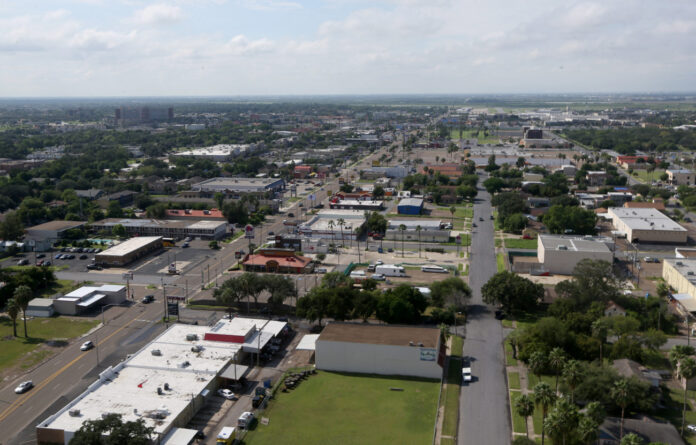McALLEN — COVID-19’s impact on the local economy and the federal government’s restrictions on international travel have left city leaders facing a projected $7.2 million deficit for the upcoming fiscal year.
On Friday, the Department of Homeland Security announced it was extending its limits on international travel for non-essential visitors at land ports of entry until at least Oct. 21.
Those restrictions, which have been in place since March, guarantee one more month of economic downturn for border areas, U.S. Rep. Henry Cuellar, D-Laredo, said in a news release Friday, following what he called a “disappointing” decision.
“Allowing individuals to fly into the U.S. but restricting travel through our land ports of entry is unfair treatment to the land ports,” Cuellar said, noting flights between the United States and Mexico have largely continued since the early days of the pandemic.
During a political event this week for the Biden for President campaign, Cuellar said he drafted and sent a proposal to DHS on safely reopening the border. His proposal would allow DHS officials to conduct health screenings for non-essential travelers at ports of entry, so that healthy travelers would be able to cross.
That proposal, however, was forwarded to the White House, Cuellar said Wednesday, which likely indicated it would be a no-go.
“We can balance the health of the individual and the health of the border economy,” Cuellar said Friday.
U.S. Rep. Vicente Gonzalez, D-McAllen, who also participated in the political event Wednesday, appeared more apprehensive about easing those restrictions.
“We want to open our bridges because it impacts us economically in South Texas, but we need to be careful,” he said in Spanish. “We need to be conscious that in Mexico there is a grave problem and there are a lot of infections, and the numbers that they are giving us are not very trustworthy.”
Cuellar, however, noted that the local economy relies heavily on shoppers during the upcoming holiday season.
And nowhere in the Rio Grande Valley can these effects be felt more than in McAllen, City Manager Roel “Roy” Rodriguez said Thursday.
“Obviously that is impacting us more than most cities across the state and certainly in the Rio Grande Valley because, as you know, cities around us are in the black. They’re OK with sales tax,” he said. “And so that shows how much McAllen is dependent on people coming from around the Valley to McAllen and the people from Mexico coming to McAllen. So it is impacting us tremendously.”
At the time of his comment, DHS had not yet extended those restrictions, but Rodriguez saw them coming a mile away.
“We don’t want it to, and we have expressed that to our congressmen and senators and to Border Trade Alliance, but if you look at the (trends), we suspect that it’s going to be extended again, and we budgeted that way,” Rodriguez said.
Sales tax revenue was down by about $7 million this fiscal year, so commissioners chose to be conservative in their projections for the upcoming year and are expecting the sales tax revenue to stay flat.
“I already feel that we’re gonna do better than that just (by) how we’re trending,” Rodriguez added.
And even though commissioners are expecting a dip in revenue for the upcoming fiscal year, they expect to balance the $421 million budget with CARES Act funds coming from Hidalgo County.

“Our budget is solid,” Rodriguez said, noting there is about $100 million worth of capital improvements. “Obviously, we’re dealing with revenue issues and expenses due to COVID, (but) we fully expect to get reimbursed by the county on expenses, even though it hasn’t happened.”
So on paper, McAllen is facing a large deficit.
“I chose not to include what we expect to get reimbursed from the county as an accounts receivable because I wanted to show the picture of where we are today,” he said. “I wanted to show the deficit, and the deficit is over $7 million.”
As such, McAllen will remain under a hiring freeze until next month, when Rodriguez reevaluates the issue. The 2020-21 budget, as proposed, only calls for one additional employee for the parks and recreation department and two or three international bridge employees.
“And the reason that we’re adding those is because we’re expanding our services to the General Services Administration, which is the federal government, and they pay us back for it,” Rodriguez said about the bridge employees. “And so that means it’s a wash. Even though we’re adding the positions, the feds pay for it.”
Commissioners are trying not to put any more undue burden on the taxpayers, he said, noting they voted earlier this week to decrease the tax rate by a fraction of a penny, going from a rate of 0.497677 cents per $100 valuation to 0.497600.
“It’s very, very small, but nevertheless, it is a decrease,” Rodriguez said. “I’m proud that the city commission was able not only not to increase the rate, but to reduce it, even under these circumstances. And so we did that very deliberately — we want to show our community that we’re thinking about them. And so I expect to have a good year next year.”
Commissioners are set to adopt the proposed 2020-21 budget Sept. 28.




